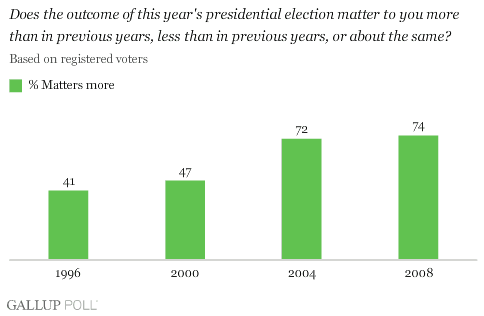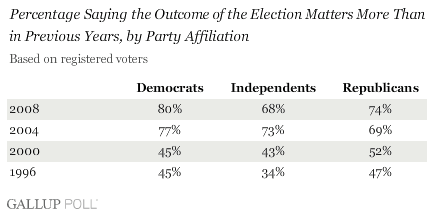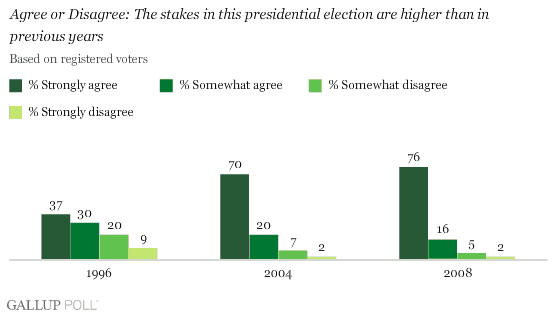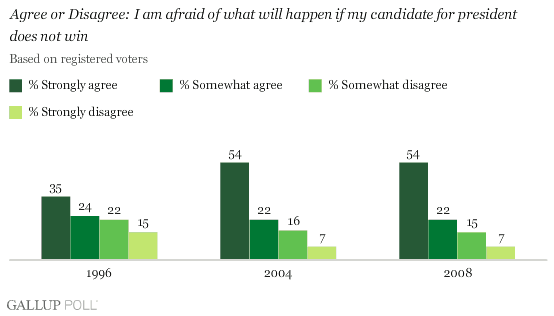PRINCETON, NJ -- A recent Gallup Poll finds 74% of Americans saying the outcome of this year's presidential election matters more to them than in previous years -- slightly more than said this about the 2004 election, and well above the figures from the 1996 and 2000 elections.

The results suggest that Americans have come to view the outcome of elections as increasingly important. While at least 7 in 10 said the election mattered more to them in both 2004 and 2008, fewer than half said this about the 1996 or 2000 elections.
The increased importance attributed to the election outcomes helps explain the surge in voter turnout in 2004, which experts predict could be eclipsed in this year's election. Gallup has found an extraordinarily high level of interest in the election throughout this year, and its data also suggest turnout will exceed what it was in 2004.
Democrats (80%) are slightly more likely than Republicans (74%) to attribute greater importance to the 2008 election outcome. That is a similar pattern to what Gallup showed for the 2004 election. In 2000, Republicans were slightly more likely to view the outcome as more important than prior elections, and in 1996, Republicans and Democrats were about equal in their perceptions.

Stakes Viewed as Higher
Voters' personal investment in the outcome is further underscored by the poll finding that 92% of registered voters agree with the statement that "the stakes in this presidential election are higher than in previous years," including 76% who strongly agree. The percentage strongly agreeing exceeds the percentage who said this about the 2004 election, and is more than twice what Gallup measured for the 1996 election.

All party groups overwhelmingly agree that the stakes in the 2008 election are higher than in prior years, but Democrats (84%) are slightly more likely to say they strongly agree than are Republicans (76%) or independents (68%).
Voters go so far as to express trepidation about the election going against their wishes. Fifty-four percent of voters say they strongly agree that they are "afraid of what will happen if [their] candidate for president does not win." Another 22% agree somewhat.
These figures exactly duplicate what Gallup measured in 2004. U.S. voters were far less likely to say they were fearful about how the 1996 election would be decided.

Republicans (59%) and Democrats (58%) are about equally likely to say they strongly agree with this statement, while independents (46%) are less likely to.
Implications
It would appear that U.S. voters as a whole view the outcome of presidential elections as more consequential than they did in the recent past. This has fueled a surge in turnout in the 2004 election, which is likely to be repeated again this Election Day. It is possible that the contested election outcome in 2000 -- when Al Gore won the popular vote but lost to George W. Bush in the Electoral College on the basis of the disputed Florida vote -- has caused more voters to realize that their vote can make a difference in the outcome, and can greatly affect the course of the nation over the subsequent four years.
Survey Methods
Results are based on telephone interviews with 957 registered voters, aged 18 and older, conducted Oct. 23-26, 2008. For results based on the total sample of registered voters, one can say with 95% confidence that the maximum margin of sampling error is ±3 percentage points.
Interviews are conducted with respondents on land-line telephones (for respondents with a land-line telephone) and cellular phones (for respondents who are cell-phone only).
In addition to sampling error, question wording and practical difficulties in conducting surveys can introduce error or bias into the findings of public opinion polls.
